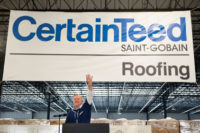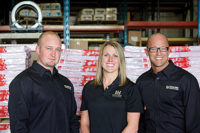
This Metro Stop in Hoboken, N.J.,
was clad with 30,000 square feet of Alcoa Reynobond material.
BAMCO, Inc., a manufacturer of metal wall panel systems headquartered in Middlesex, N. J., has seen its business grow by 91.7 percent in the past four years, earning the company a spot on the Inc. 5,000 as one of the fastest-growing privately owned companies in the nation. According to Allan Pasternak, who founded the company in 1986 with partner Mike Biviano, earning a listing in the 2008 Inc. survey is a testament to the company’s panel systems and its employees.
“It’s a tribute to a durable and timely product, a staff that pays attention to detail and customer’s needs, as well as an approach that simplifies the installation of our patented composite wall systems,” he said. Pasternak noted that part of the reason for BAMCO’s success lies in the fact that the company began exclusively as installers of all types of wall systems in 1986, gaining a wealth of field experience and an understanding of contractors’ needs on-site. Five years later, the company decided to focus on composite metal panels - which consist of two sheets of metal chemically bonded to a low-density polyethylene core - because of their durability, aesthetics, and growing demand.

AtlantiCare Medical Center in Atlantic
City, N.J., features
the BAMCO G-500 panel system. (Photos courtesy of BAMCO.)
According to Balaam, another factor propelling the company’s dramatic expansion is that its panels are 85 percent recycled aluminum. “It’s an environmentally sound material with a green advantage that will help to promote future demand for the company’s products,” he said.
Balaam maintains that now is the time for roofing contractors and distributors to diversify into composite panels. “Roofing is one of the industries - if not the industry - that benefits from composite panels,” he said. “The industry is very competitive. Our margins can be much higher than those in roofing.”
He believes that BAMCO is the ideal company to assist contractors and distributors in this transition because they provide custom-designed, detailed shop drawings as well as a support staff with extensive experience that is on call for questions and advice.
“We supply a fully engineered, fully fabricated system with our patent - just screw it to the building and you’re done,” Balaam said. Since the system averages 2 pounds per square foot, it can be installed by a two-man crew with no special equipment, and the system can be used for both new construction and retrofit. “It can be applied over metal studs, a wood frame, block wall - any number of substrates,” he said. “We give you a system that’s user friendly, so you can be productive and make money now.”

DeSimone
BMW in Mount Laurel, N.J.,
sports a 21,000-square-foot G-500 panel system.
Benefits for Contractors and Distributors
Jon Farrer is the sales manager at the Pittsburgh office of North Coast Commercial Roofing Systems, a distributor of commercial roofing systems and related accessories headquartered in Twinsburg, Ohio. The company, a subsidiary of Beacon Roofing Supply Inc., has 16 locations in eight states. North Coast has worked closely with BAMCO for more than three years.“The system and customer service BAMCO provides set them apart,” said Farrer. “The extrusion works well with the system and it’s easy to install. It’s the whole package that they provide that is the key. They do the design, engineering and fabrication, and provide field assistance. Instead of just buying raw materials and fabricating panels themselves, contractors get the entire package perfectly manufactured with shop drawings. They’re a full-service company.”
Panel systems have comprised a growing segment of the market, said Farrer. “Over the last 10 years, the market for composite panels has been growing every year,” he said. “It’s a good specialty to have.”
Panel systems can help contactors add value to the job, increase profit margins and make them more valuable to general contractors, said Farrer. “Most of the companies we work with do roofing and sheet metal, and most GCs are looking for full service, so if you have one contractor doing both roofs and panels, it’s much easier,” he said. “Well-rounded companies make the sell easier for everyone, and the warranties are with one contractor.”
Farrer cited the advantages of having the roofing contractor install both the roof and the panels. “The panel goes up over the wall, over the parapet, so it’s good to have the roofing contractor install them,” he said. “It’s best to have one contractor install them both, and the roofer is the expert. Two contractors can mean more trouble, or damage the roof system once it’s completed. That’s why GCs are looking for a one-stop shop, with engineering and everything. And that’s what we and BAMCO provide.”
Even complicated jobs are easy to install, noted Farrer, who pointed to a Porsche-Audi dealership in Rockville, Md., as an example. “It featured a curved façade around the whole building,” he said. “The contractor had never done anything like it before, and there was a very tight window to get the job done. BAMCO got the material there on time and helped with field assistance, and they got it done a week early.”

Contractors installed a 29,000-
square-foot panel system at Randolph High School in Randolph,
N.J. The G-500 system was
comprised of Alcoa Reynobond.
Ease of Installation, Increased Profit Margins
Ryan Kraus is president of Kraus Commercial Roofing in Ottsville, Pa. His firm has worked with composite panels for the last seven or eight years, and with BAMCO for the last three. “The combination of the ease of installation and BAMCO’s knowledge and technical support really makes the whole thing go pretty smoothly,” Kraus said. “The shop drawings and engineering, as well as their technical support, have been very helpful.”Kraus has noticed that the manufacturer’s panel systems are increasingly specified by architects, and he noted that some building owners have decided to install them at his suggestion. “Very often the panel system is integral to the coping and edge metal, so it’s easier to have one company installing them both,” he said. “And, anytime a building owner or general contractor can deal with fewer contractors or subcontractors, so much the better.”
“We’re just completing a project right now with a lot of windows, and the BAMCO panels are tied in with other panels, so it was a very complicated effort,” he said. “Every job is different, but the more intricate and complex the installation, the better the profit margin. We have developed a great skill set with these panel systems, and they can help with our profit margins.”
Kevin Gough, vice president of Alan Kunsman Roofing in Freemansburg, Pa., said his company saw the benefits of adding composite wall panel systems to its arsenal of offerings, and an alliance with BAMCO made it easy for them to enter the field.
“We’ve been installing architectural metal work since 1983, mostly snap-seam roof panels and façade work,” Gough said. “With the changes in the industry, we’ve been ramping up our metal roof and wall panels.”
The company’s first project with BAMCO panels was the Fisher Field Press Box at Lafayette College in Easton, Pa. “Our first project went very well for us, with solid profit margins. The margins are higher than those with our regular commercial roofing work,” he said. “If metal panels are in the specs, now we can bid those jobs without buying a lot of equipment.”
“The beauty of the system is, once you have your plumb and level lines, you’re set to go,” said Gough. “The key is the measurements. Most architects want the panels and seams to line up with the windows, so the numbers have to be dead on. Once you have the dimensions, they do the Cad drawings and go to the C and C machines and do the cuts and return bends. It truly is amazing. The aluminum extrusion gives it rigidity. When installing the panels, you start at the bottom and stack them vertically. The extrusion is the hanging system as well as bracing for the panel. The trick in the field is to make sure it’s plumb and level. After that, it just rolls.”
Panels can be crated in groups for each side of a building, noted Gough, who added that the the crates also provide protection for the panels. “In our case, we were just 1½, 2 hours away, so they could ship us the first section while they were still fabricating the rest,” he said. “BAMCO was very good at delivering the loads as we needed them. They’re very, very good at the coordination and delivery of the panels, getting the right parts at the job on time.”
According to Bob Balaam of BAMCO, panels had to be caulked in the past. “Caulk can fail and attract dust and dirt,” he said. “We developed a hard silicone gasket that snaps in place. It can be bonded to other products because it’s 100 percent silicone. On the whole, it’s a better system and one with a very clean look because you can’t see the fasteners.”
He added that the finish on the composite panels is warranted for 20 years, and lead times at BAMCO for shop drawings (2-4 weeks on smaller projects) and fabrication (2-4 weeks) are relatively short by industry standards.
When asked to sum up his company’s position in the growing composite panel market, Balaam’s reply was simple and straightforward: “Business is booming.”




